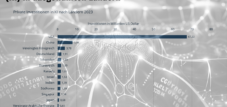China's AI offensive: TikTok owner ByteDance with AI model Doubao 1.5 pro and DeepSeek are leading China's AI push
Xpert pre-release
Language selection 📢
Published on: January 23, 2025 / Update from: January 23, 2025 - Author: Konrad Wolfenstein

China's AI offensive: TikTok owner ByteDance with AI model Doubao1.5 pro and DeepSeek lead Chinese AI push - Image: Xpert.Digital
AI in the global race: How ByteDance and DeepSeek are challenging the West - quick analysis
China's AI offensive: Bytedance and Deepseek lead the technological advance
The rapid progress in the development of artificial intelligence (AI) are the focus of a global technological race in which China is increasingly gaining influence. Two prominent actors in this area, Bytedance and Deepseek, have established themselves as a pioneer by developing innovative AI models that are not only technically impressive, but also act as direct competition with established western companies such as Openai.
Bytedance and the Doubao 1.5-Pro model
Bytedance, known as the parent company of the popular Video app TIKTOK, recently presented its AI flagship Doubao-1.5-Pro. This model stands out due to its efficiency and high performance and was targeted to challenge openais models in the area of AI-Reasoning technologies. Bytedance states that Doubao-1.5-Pro will survive the O1 Openai model in the Aime Benchmark. This benchmark measures the ability of AI systems to understand complex instructions and to react to them.
Innovative approaches to bytedance
A central feature of Doubao-1.5-Pro is the resource-saving training approach. Bytedance relies on a server cluster with flexible support for low-end chips, which significantly reduces the training costs. This strategy enables the company to offer top performance at affordable prices.
The aggressive pricing of Doubao-1.5-Pro illustrates the ambitions of the company:
- Doubao-1.5-Pro-32k: 2 Yuan (~ 0.26 €/~ 0.28 dollars) per million tokens
- Doubao-1.5-256K: 9 Yuan (~ € 1.17/~ $ 1.26) per million tokens
With these prices, Bytedance positions itself as an inexpensive provider that appeals to both small and large companies that require AI solutions.
Deepseek and the R1 models
In addition to bytedance, the Chinese startup Deepseek plays a central role in China's AI offensive. The company presented two remarkable models: Deepseek-R1-Zero and Deepseek-R1. Both models are characterized by advanced reasoning skills and, according to Deepseek, exceed the performance of western models in certain benchmarks.
Deepseek-R1-Zero
- This model was only trained with Reinforcement Learning (RL) without classic fine tuning.
- It is able to develop independent skills such as generation of long chains of thought and rethink problem solutions.
Deepseek-R1
- In contrast to R1-Zero, this model combines RL with monitored fine tuning.
- It shows top performances in areas such as mathematics, programming and general knowledge and achieves the performance of the O1 model from Openai.
Deepseek claims that R1 is superior in benchmarks such as Aime, Math-500 and SWE-Bench Verified. In addition, Deepseek offers an inexpensive use of its model: with 16 yuan (about $ 2.20) per million tokens, it is significantly below the prices of Openai (438 Yuan for the same use).
More about it here:
Opportunities and challenges
The progress of Bytedance and Deepseek impressively show that Chinese companies, despite geopolitical hurdles and US export restrictions on advanced AI chips, make considerable progress. These developments could threaten the market share of western companies such as Openai - both in terms of performance metrics and cost efficiency.
Technological and regulatory challenges
Although the progress is remarkable, Chinese companies face challenges:
- Change of language: Deepseek models change unintentionally between different languages, which makes it difficult to use in specific contexts.
- Restricted functionalities are currently missing support for functions such as Function Calling, expanded dialogues and JSON editions.
- Regulatory restrictions: Chinese AI systems are subject to strict state requirements that restrict the answers to sensitive topics and thereby influence the flexibility of the models.
Reactions from the USA
China's technological progress cause mixed reactions in the United States. On the one hand, companies such as Openaai and Nvidia take the competition seriously, on the other hand, the US government reacts with tightened export controls to secure their own technological lead.
Export controls
The US government is planning stricter controls for exporting progressive AI chips to China. The aim is to slow China's technological progress. However, these measures come across criticism:
- The Semiconductor Industry Association (SIA) warns that such restrictions could affect the competitiveness of the US economy.
- NVIDIA describes the regulations as "unprecedented miscalculated" and fears a weakening of the US leadership role in AI development.
Intensification of research
In order to remain competitive, US technology companies are massively investing in the further development of their AI systems:
- Openai recently introduced its new model O3, which should score with improved Reasoning capabilities.
- Anthropic, an emerging competitor, has developed an updated version of his model Claude within a few months.
Suitable for:
- Are AI language models used in industry, e.g. robotics, automation processes, smart factories or traffic control systems?
- The next level of artificial intelligence: Autonomous AI agents are conquering the digital world – AI agents versus AI models
Access restrictions
Some companies exclude Chinese users from their technologies:
- Openai plans to block access to his API in China, which in particular presents Chinese startups with challenges.
- Microsoft offers instructions for switching to local services to react to Openais withdrawal from China.
Geopolitical tensions and cooperation
Despite the tense situation, there are also examples of cooperation. The number of research collaborations in the ACI area between the USA and China has quadrupled in the past ten years. In addition, some US companies invest in data centers outside of China to gain access to progressive AI chips and at the same time minimize the geopolitical risks.
Focus on security and ethics
The increasing importance of Chinese AI models raises questions about security and ethical aspects. Critics warn of the possibility of censorship and manipulation by state-controlled AI systems. This results in demands for greater regulation and review of Chinese technologies.
China's role in global AI development
The progress of Bytedance and Deepseek underline that China plays an increasingly important role in the global AI landscape. Despite existing challenges, Chinese companies quickly close the gap to western market leaders. At the same time, the competition remains intensive because both the USA and China further strengthen its efforts in the field of AI research and development.
China's AI offensive marks the beginning of a new era in which innovations, economic strategies and geopolitical interests are closely intertwined. It remains to be seen how this dynamic will affect the global technology landscape. However, it is clear that the race for dominance in AI development will be one of the most formative challenges of our time in the coming years.
Our recommendation: 🌍 Limitless reach 🔗 Networked 🌐 Multilingual 💪 Strong sales: 💡 Authentic with strategy 🚀 Innovation meets 🧠 Intuition
At a time when a company's digital presence determines its success, the challenge is how to make this presence authentic, individual and far-reaching. Xpert.Digital offers an innovative solution that positions itself as an intersection between an industry hub, a blog and a brand ambassador. It combines the advantages of communication and sales channels in a single platform and enables publication in 18 different languages. The cooperation with partner portals and the possibility of publishing articles on Google News and a press distribution list with around 8,000 journalists and readers maximize the reach and visibility of the content. This represents an essential factor in external sales & marketing (SMarketing).
More about it here:
Bytedance and Deepseek: China's answer to Openai and the future of AI background analysis
China's rise in the world of artificial intelligence: a new race for supremacy
The landscape of artificial intelligence (AI) is changing rapidly, and China is increasingly positioning itself as a heavyweight in this global race. In particular, two Chinese technology companies, Bytedance and Deepseek have caused a sensation with the development of advanced AI-Reasoning models. Their innovations not only question established Western companies such as Openai, but also raise questions about the global technology leadership and the geopolitical effects.
Bytedance and Doubao-1.5-Pro: A leap forward in performance and efficiency
Bytance, the company behind the popular social media platform TikTok, has taken a significant step in AI development with the introduction of Doubao-1.5-Pro, a powerful AI model. The model is intended to represent a significant improvement compared to its predecessors and even outperform Openai's top model in certain benchmarks. This is a remarkable success, since Openai has long been considered a leader in the development of generative AI models. The decisive advantage of Doubao-1.5-Pro is not only its performance, but also in its efficient training approach.
Bytedance has chosen a resource-saving approach that enables the model to train with a specially developed server cluster that also flexibly supports low-end chips. This strategy aims to reduce the high costs of AI training, which are often an obstacle to broad development. "We found that with this approach we can achieve a remarkable performance without spending immense sums," the company said. This resource-efficient approach could provide Bytedance a competitive advantage because it enables faster and cheaper development and provision of AI models.
The pricing of Bytedance for Doubao-1.5-Pro is also very aggressive and aims to make the model accessible to a wider audience. With prices of 2 yuan per million tokens for the 32K model and 9 yuan for the 256K model, the costs are significantly lower compared to other models. This price strategy could accelerate the acceptance and use of Doubao-1.5-Pro in the general public and other companies. In essence, Bytedance pursues the goal of consolidating its position in the AI sector and playing a leading role in the development of affordable and powerful AI solutions. The development of Doubao-1.5-Pro is a clear sign of China's ambitions in the field of artificial intelligence.
Deepseek and the R1 models: a new era of Reinforcement Learning
Deepseek, another Chinese Ki startup, also caused a sensation with the introduction of his R1 model family. The two models, Deepseek-R1-Zero and Deepseek-R1, represent an important step in the development of AI-Reasoning models. Deepseek-R1-Zero takes a unique way by being trained exclusively with Reinforcement Learning. This means that the model is not dependent on monitored fine tuning, but develops its skills through trial-and-terrorist learning and reward mechanisms. This procedure enables the model to develop skills independently such as generating long chains of thought and rethinking solutions. It is a fascinating example of how AI can improve through interaction with her surroundings. "We have seen that the Reinforcement Learning approach can lead to amazing results and that the AI independently exploits its own potential here," explained the senior scientist from Deepseek.
The second model, Deepseek-R1, follows a hybrid approach that combines Reinforcement Learning with classic fin tuning. This approach is intended to use the advantages of both training methods to create a powerful and versatile AI model. Deepseek claims that R1 exceeds the performance of Openai's top model in areas such as mathematics, programming and general knowledge. The results in benchmarks such as Aime, Math-500 and SWE-Bench Verified indicate that Deepseek is able to compete with the established actors in the AI industry. Like bytedance, Deepseek pursues the goal of making its technology as accessible as possible and the company Deepseek-R1 offers 16 yuan (about $ 2.20 $) per million tokens, which is significantly cheaper than the 438 called up by Openai Yuan for the same use. The cost-effective use of Deepseek-R1 could further accelerate the distribution and acceptance of the model and thus have a significant influence on the AI landscape.
Suitable for:
- AI models in numbers: Top 15 large language models – 149 basic models / “foundation models” – 51 machine learning models
- AI language models Bert and Gpt. Which companies are behind it, what exactly do they do and where are the differences?
Effects and challenges of the Chinese AI offensive
The progress of Bytedance and Deepseek clearly show that China is making significant progress in AI research despite the US export restrictions for advanced AI chips. Developments are not only a challenge for Western companies, but could also fundamentally change the global technology landscape. The powerful and inexpensive models from Bytedance and Deepseek could conquer market shares of established players such as Openaai and intensify the competition in the AI industry. The effects could also extend to other areas, since AI models are increasingly being used in many industries, from education to healthcare.
Despite these impressive progress, there are also challenges and restrictions. The models from Deepseek, for example, have difficulty maintaining the language and currently do not support Function Calling or extended dialogues or JSON editions. In addition, Chinese AI systems are subject to strict regulations that restrict their answers to certain topics. This regulation could affect the development and possible uses of the models and lead to a certain censorship.
The fact that the US government is considering stricter export controls for advanced AI chips and technologies to China shows that the American government is concerned with the rapid progress of China in the field of AI. The aim of these controls is to secure the technological advantage of the United States and to slow down China. However, the Semiconductor Industry Association (SIA) has warned of possible damage to the US economy and global competitiveness, as this could lead to an unequal competition and could possibly slow innovations. NVIDIA criticized the planned regulations as “unprecedented misguided” and fears a weakening of the US leadership role in the area of AI.
The reaction of Western technology companies to the Chinese AI promotion
The large technology companies, especially in the USA, observe developments in China with great attention and react with a mixture of concern and increased efforts. Openaai reacted with the introduction of the new O3 model to defend its management position. The company has made it clear that it continues to invest in research and development in order to keep up with the competition and to assert the technological top. Anthropic has also reacted in just three months with an improved version of his Chatgpt competitor Claude. The rapid development and publication of new models shows how intensive competition in the AI industry has become.
Some companies also restrict access to their AI technologies for Chinese users. For example, Openai plans to block access to his API in China, which could affect many Chinese startups. In response to Openais retreat from China, Microsoft published instructions that enable Chinese customers to switch to their local services. These measures show that geopolitical tensions between the USA and China have a direct impact on the AI sector.
Despite these tensions, there are still collaborations and investments between the USA and China in the field of AI. The number of AI research cooperation between the USA and China has quadrupled in the past ten years. Some US companies invest in data centers outside of China to gain access to advanced AI chips that may be more difficult to obtain due to the export restrictions in China. These collaborations show that despite the geopolitical tensions, there is a willingness to work together and benefit from the respective strengths.
The ethical and safety aspects of AI development
There are increasing concerns about security and ethical aspects of Chinese AI models. Critics warn of possible censorship and manipulation risks by Chinese AI systems. State regulation could lead to AI models giving politically motivated answers and censoring or changing certain content, which is a potential risk of public opinion and free discourse. There are therefore demands for a greater regulation and review of AI technologies from China to ensure that they follow ethical principles and are not used for harmful purposes.
China's rise in the AI world is an important event that raises a number of questions and challenges. Bytedance and Deepseek's rapid progress show that China is able to compete with the leading western companies and play an important role in global AI development. The response from Western companies to this challenge will be decisive in order to keep the leadership role in the AI industry and ensure that AI technologies are used responsibly. The coming years will show how this competition is developing and what effects it will have on the global technology landscape.
The effects of these developments on humanity could be profound. The way KI is developed and used could change people's coexistence. The speed of change has made it essential that not only technicians, but also politics and society deal with the ethical, moral, economic and security -related questions. The discussions about the possible dangers and advantages of the AI and the associated ethical questions will intensify and is already an important part of the public debate. It is to be hoped that in the development and implementation of AI technology, the positive effects for humanity will always be in the foreground.
We are there for you - advice - planning - implementation - project management
☑️ SME support in strategy, consulting, planning and implementation
☑️ Creation or realignment of the digital strategy and digitalization
☑️ Expansion and optimization of international sales processes
☑️ Global & Digital B2B trading platforms
☑️ Pioneer Business Development
I would be happy to serve as your personal advisor.
You can contact me by filling out the contact form below or simply call me on +49 89 89 674 804 (Munich) .
I'm looking forward to our joint project.
Xpert.Digital - Konrad Wolfenstein
Xpert.Digital is a hub for industry with a focus on digitalization, mechanical engineering, logistics/intralogistics and photovoltaics.
With our 360° business development solution, we support well-known companies from new business to after sales.
Market intelligence, smarketing, marketing automation, content development, PR, mail campaigns, personalized social media and lead nurturing are part of our digital tools.
You can find out more at: www.xpert.digital - www.xpert.solar - www.xpert.plus
























